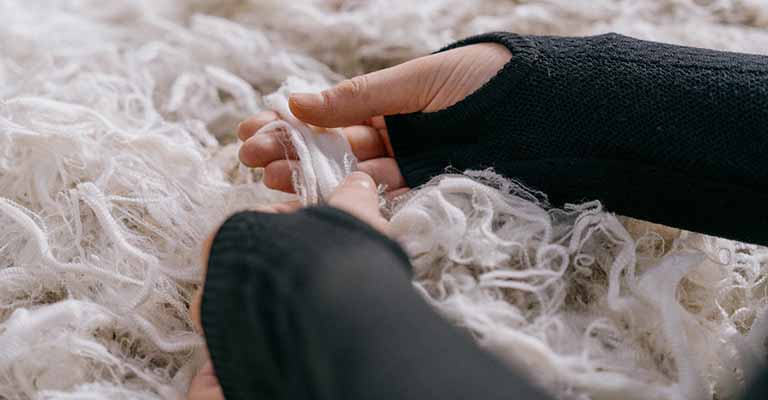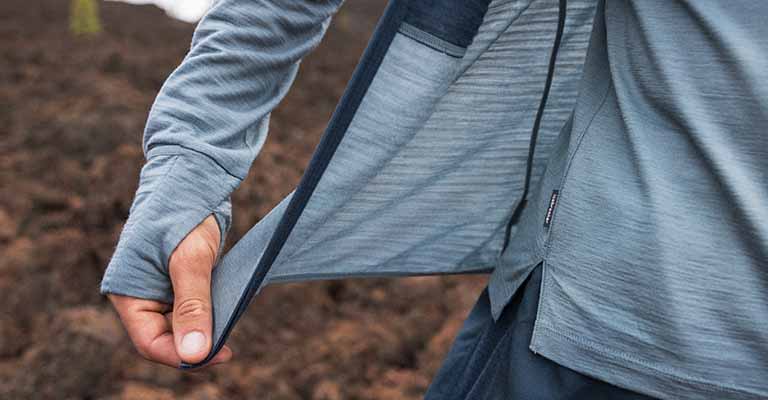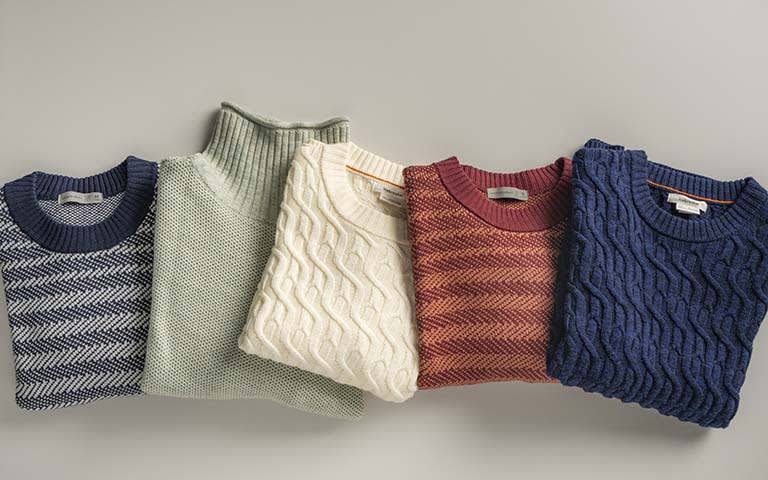How icebreaker Is Pioneering Natural Fiber Clothing
March 6, 2025 | icebreaker
At icebreaker, we are committed to reducing reliance on synthetic materials by using natural fibers. In 2023, we reached 96.14% plastic-free fibers, making significant progress toward our goal of 100%. Our merino wool is 100% traceable to the source, and we partner with growers committed to regenerative farming.
This commitment extends beyond materials. We’ve secured 10-year supply contracts with growers to ensure long-term partnerships and responsible sourcing. By 2028, all of our wool will come from farms implementing regenerative practices, helping to support a healthier ecosystem.
What Counts as a Natural Fiber Fabric?
Natural fiber fabrics are textiles made from materials that originate in nature, such as plants, animals, or minerals, rather than synthetic, petroleum-based sources. These fibers offer exceptional breathability, comfort, and durability. Unlike synthetics, which are made from plastic-based materials, natural fibers come from renewable sources and bring unique benefits to performance apparel.
At icebreaker, we focus on high-performing natural fibers that provide superior comfort and function while reducing environmental impact. Here’s a closer look at the natural fibers we use:
Merino Wool
Sourced from Merino sheep, this wool is renowned for its fine fibers, which make it exceptionally soft and comfortable against the skin. Merino wool naturally regulates body temperature, keeping you warm in cold conditions and cool in warm climates. It also manages moisture and resists odors, making it ideal for activewear.
For many, 100% merino wool is a game-changer for travel and layering, offering versatility and comfort without sacrificing style. One traveler shares how it became an essential part of her packing list:
“I travel internationally quite a bit, carry-on only. I still overpack because I love beautiful clothes. I bought an Icebreaker 200 merino wool black long sleeve shirt after trying on different wool tops in the REI store. This was the softest. I loved this shirt for travel. I will buy more and pack less tops. People say they wear this year-round, but I couldn't. It was perfect for the month of December in Italy. In my opinion, this is an excellent shirt for 20°F to 70°F. Great layering piece. It stays fresh, washable in the sink with a bit of bath gel about once a week. I think the black one and gray or similar neutral color would be perfect in cool weather instead of taking six tops.” - Traveler from Massachusetts

TENCEL™ Lyocell
TENCEL™ Lyocell is a plant-based fiber manufactured by Lenzing, known for its high comfort and breathability. Made from wood sourced from responsibly managed forests, it is a natural, renewable raw material. The production process is resource-efficient and environmentally friendly, using a closed-loop system that recycles water and solvents, minimizing waste.
TENCEL™ Lyocell is also exceptionally gentle on the skin. In icebreaker's Cool-Lite™ collection it is blended with merino wool to enhance breathability, moisture management, and next-to-skin comfort, making it a go-to choice for lightweight tees, tanks, and activewear. One hiker shares why it has become an essential part of her closet:
“I love the cool lite fabric! The combination of materials is just right to provide temperature regulation of wool without any scratchiness. I have four of these in short sleeves and two in long sleeves. I wear them all the time. I bought my first one for hiking but liked it so much I wear them for everyday.” – Lucy Frog from Boulder, CO
Organic Cotton
Organic cotton is a plant-based fiber grown without synthetic pesticides or fertilizers, resulting in a fabric that is naturally soft, breathable, and durable. It is also hypoallergenic, making it a great choice for those with sensitive skin. Choosing organic cotton helps reduce environmental impact while supporting sustainable farming practices.
At icebreaker, we blend organic cotton with merino wool to create fabrics that are lightweight, breathable, and entirely natural. This combination enhances comfort and performance, giving you the best of both fibers in everyday essentials. For those who want a versatile, go-to wear, our Central line of organic cotton blended with merino offers the perfect balance of comfort and practicality. One customer shares how it has become a wardrobe staple:
"I use this as a regular all-purpose t-shirt. It feels and looks great. It's not too long on the torso, and the sleeves are the right fit. If you're in a laundry pinch, or trying to break scrounge records, or traveling, it can do multi-day duty with no one the wiser. Very practical and smart." - Pete from Washington, DC
Linen
Linen is a lightweight, breathable fiber made from the flax plant, valued for its natural antibacterial properties and moisture management. It also requires less water and fewer pesticides to produce compared to other crops, making it a sustainable choice.
At icebreaker, we blend flax linen with merino wool to create soft, breathable fabrics that enhance comfort and performance. Our linen is grown in its natural habitat, Belgium, ensuring high-quality production. When combined with merino, flax fibers improve moisture absorption, keeping you dry and comfortable before the fabric even feels wet.
Customers love the softness and fresh feel of the Merino-Linen blended clothing, especially for all-day wear. One traveler shares his experience:
"I didn't think the material would be as soft as it is. Also, after wearing it for many hours during a recent trip, I can confirm that it does not hold any odors!" - Gary from Montreal

Advantages of Natural Fiber Clothing
Natural fiber clothing offers comfort, performance, and a lighter reliance on synthetic materials. At Icebreaker, we prioritize merino wool, TENCEL™ Lyocell, organic cotton, and linen because they work in harmony with the body and the environment.
Here’s why choosing natural fiber clothing makes a difference:
Breathable and Temperature Regulating
Natural fibers allow air to circulate and moisture to escape, helping to regulate body temperature in a way that synthetic fabrics cannot. What makes Merino wool good to wear is its ability to keep you warm in the cold and cool in the heat, making it ideal for all-season wear. It’s fine fibers create a natural crimp, trapping air to insulate against cold while also releasing heat in warm conditions.
Odor Resistant and Requires Less Washing
Thanks to the natural antibacterial properties of fibers like merino wool, they help resist odor buildup. This allows for more wear between washes, reducing water and energy consumption compared to synthetic clothes that require frequent laundering. Merino wool naturally manages moisture and releases it into the air, keeping you dry and comfortable.
Free from Microplastics
Studies have shown that synthetic fabrics shed microplastic fibers into the environment every time they are washed. These microscopic particles pollute waterways and harm marine life. Natural fibers, on the other hand, break down naturally without releasing harmful pollutants.
Make the Move to Natural™
The future of clothing is natural. At icebreaker, we are committed to replacing synthetics with high-performing fibers from nature - better for you and the planet. Natural fibers breathe and regulate temperature, leaving behind nothing but comfort and performance.
Join us in the Move to Natural™. Discover clothing that feels good, performs better, and leaves a lighter footprint.
Frequently Asked Natural Clothing Questions
Q: Is wearing natural fibers better for you?
A: Yes, natural fibers offer superior breathability, temperature regulation, and skin-friendly comfort compared to synthetics. They help manage moisture from the body, resist odors naturally, and reduce exposure to petrochemical-based fabrics. At icebreaker, we use high-quality natural fibers designed for performance, durability, and long-term wear, making them a better choice for both comfort and sustainability.
Q: Can natural fibers be stretchy?
A: While most natural fibers don’t have the same built-in stretch as synthetics, they can still offer great flexibility and movement. Merino wool, for example, has a natural elasticity that allows it to stretch and recover. At icebreaker, we also innovate with fabric blends and knitting techniques to provide stretch without relying on synthetic elastane, ensuring natural comfort with a performance-driven fit.
Q: Do natural fibers wrinkle easily?
A: Some natural fibers, like linen and cotton, may develop wrinkles due to their structure, but not all natural fabrics wrinkle easily. Merino wool, for example, is highly resilient and wrinkle-resistant, making it perfect for travel and everyday wear. At Icebreaker, our blends and fabric innovations enhance durability and minimize wrinkles, so you can enjoy the benefits of natural fibers without the hassle.
More for you

How to Care for Your Merino Wool Sweater | icebreaker®
November 21 2024 | icebreaker

The Benefits of Natural Fiber Apparel | icebreaker®
September 12 2024 | icebreaker

Are Natural Fabrics Waterproof? | icebreaker
October 26, 2023 | icebreaker











